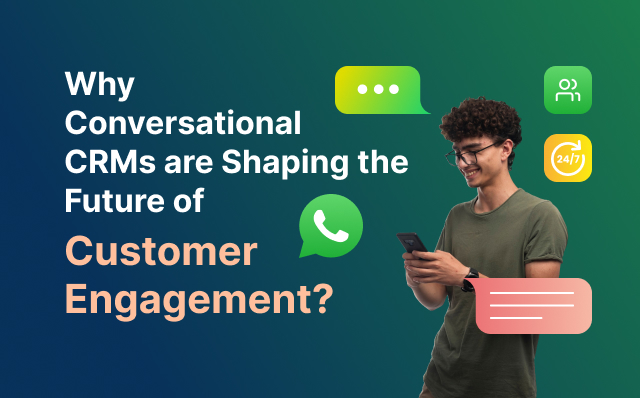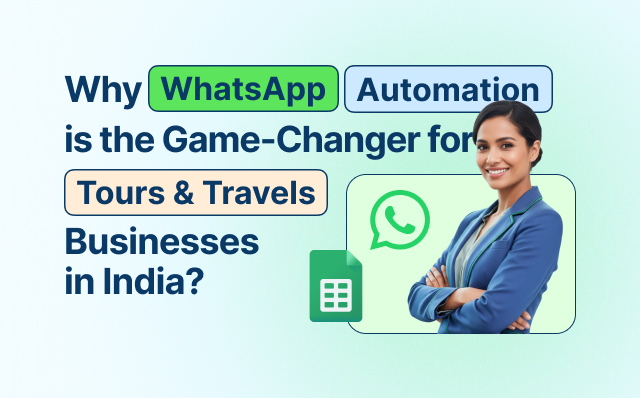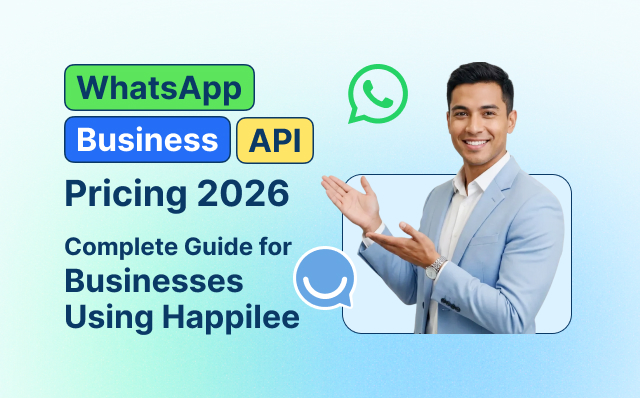Businesses are continuously modifying their methods to improve client engagement in today’s digitally driven society. Conversational CRMs, which easily interact with platforms like WhatsApp and allow organizations to provide real-time, tailored, and intuitive communication, are at the heart of this change. We’ll look at why Conversational WhatsApp CRM is turning into a game-changing tool for contemporary companies in this blog.
The Rise of Conversational CRMs
Traditional CRMs have long been the backbone of customer relationship management. They track customer data, organize communications, and support sales. However, as customer expectations grow, businesses need tools that enable real-time, two-way conversations—and this is where conversational CRMs come in.
Unlike static CRMs, conversational CRMs leverage platforms like WhatsApp, Messenger, and SMS to enable dynamic communication. With Conversational WhatsApp CRM, businesses can meet customers where they already are: on their phones, in apps they use daily.
Key Features of a Conversational WhatsApp CRM
- Seamless Integration with WhatsApp
A conversational WhatsApp CRM integrates effortlessly with the WhatsApp Business API. This allows businesses to send, receive, and manage messages directly from their CRM, ensuring all customer interactions are centralized. - Personalized Communication
It enables businesses to deliver tailored responses based on customer behavior, past interactions, and preferences, creating a more engaging experience. - AI-Powered Automation
With built-in chatbots, businesses can automate common inquiries, reducing response times and increasing efficiency. AI tools also allow for smart routing of messages to the right teams. - Real-Time Notifications
From order updates to appointment reminders, businesses can send instant notifications that keep customers informed and engaged. - Comprehensive Analytics
A conversational CRM tracks customer interactions, providing actionable insights that help refine engagement strategies.
Why Conversational CRMs Are the Future of Engagement
1. Meeting Customer Expectations
Customers today demand fast, easy, and accessible service. With conversational WhatsApp CRM, businesses can provide instant responses, fostering trust and loyalty.
2. Building Personalized Experiences
By using customer data intelligently, businesses can craft interactions that feel relevant and personal. For instance, a customer asking about a product can receive recommendations based on their purchase history.
3. Increasing Operational Efficiency
Automation through chatbots and AI reduces the burden on human agents. Repetitive queries are managed automatically, allowing teams to focus on high-value interactions.
4. Driving Conversions
Engaging customers in real time increases the likelihood of conversion. A quick response to a product inquiry or a targeted promotion delivered via WhatsApp can turn potential leads into loyal customers.
5. Cost-Effective Engagement
Unlike traditional channels, WhatsApp is more affordable for businesses. By integrating with a conversational CRM, companies can reduce costs while improving customer satisfaction.
The Role of WhatsApp in Conversational CRMs
WhatsApp is a cornerstone for conversational CRMs due to its global popularity and ease of use. Here’s how businesses are leveraging conversational WhatsApp CRM:
- Customer Support: Providing instant resolutions to queries or issues.
- Lead Nurturing: Engaging prospects with personalized messages and follow-ups.
- Feedback Collection: Using WhatsApp to gather real-time feedback from customers.
- Sales Assistance: Guiding customers through purchases with live chat or chatbot support.
Industries Benefiting from Conversational CRMs
- E-Commerce
Retailers use WhatsApp CRM to manage orders, send updates, and provide post-purchase support, enhancing the shopping experience. - Travel and Tourism
Travel companies leverage conversational CRMs to manage bookings, answer FAQs, and send itinerary updates in real time. - Healthcare
Clinics and hospitals use WhatsApp CRM to confirm appointments, share reports, and provide teleconsultation support. - Banking and Finance
Banks employ conversational CRMs for instant customer service, loan application updates, and secure communications.
How Happilee Simplifies Conversational CRM
At Happilee, we understand the importance of meaningful customer engagement. Our platform leverages the WhatsApp Business API to deliver unmatched CRM capabilities tailored to your business needs.
Key Features of Happilee’s Conversational WhatsApp CRM
- WhatsApp Bulk Messaging: Easily send promotional or informational messages to thousands of customers.
- AI-Powered Chatbots: Automate responses to common queries, ensuring instant service.
- Omnichannel Support: Manage interactions across WhatsApp, email, and SMS from a single dashboard.
- Customizable Workflows: Tailor chatflows and automated journeys to match your brand’s tone and requirements.
Preparing for the Future of Customer Engagement
Businesses that adopt conversational WhatsApp CRMs today are positioning themselves to thrive in a competitive landscape. As the focus shifts from transactional to relational engagement, these tools will enable businesses to build deeper, more meaningful connections with their customers.
Conclusion
The future of customer engagement lies in Conversational CRMs, and WhatsApp is at the forefront of this revolution. By integrating real-time, personalized, and efficient communication tools, businesses can enhance customer experiences and drive sustainable growth.
If you’re ready to elevate your customer engagement strategy, explore Happilee’s Conversational WhatsApp CRM today. Let’s build a future where every customer feels heard, valued, and supported.


